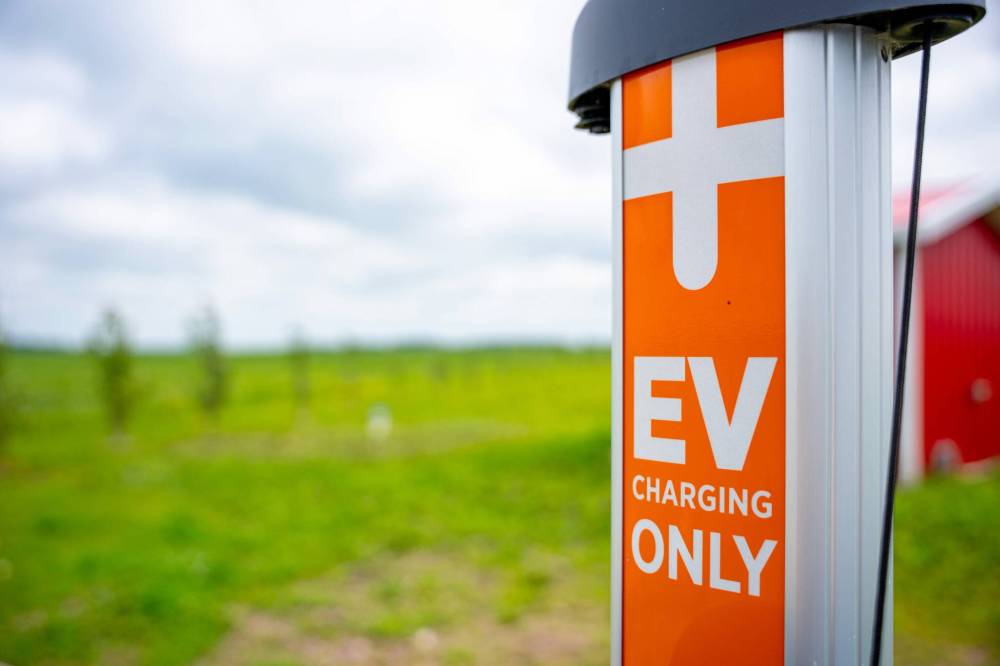Technology
Manitoba Launches Six New EV Charging Stations by 2027

The Manitoba government has announced plans to construct a network of six high-powered electric vehicle (EV) charging stations along the route between Winnipeg and Thompson. This initiative is part of a broader strategy aimed at achieving net-zero emissions by 2050. The project is expected to be fully operational by April 2027 and represents a significant step towards enhancing the province’s electric vehicle infrastructure.
A key component of the Kinew government’s strategy includes addressing the deficiencies in Manitoba’s EV charging facilities. In an exclusive interview, Environment and Climate Change Minister Mike Moyes expressed optimism that the new infrastructure will encourage more residents, particularly those in northern and remote communities, to transition to low-emission vehicles. Moyes emphasized that “this is a way that we’re trying to connect people, connect different communities and really decrease that range anxiety,” a common concern among potential EV users.
The new level-three chargers will be strategically installed approximately 150 kilometres apart in communities such as Lundar, Lake St. Martin, Grand Rapids, Ponton, Wabowden, and Thompson. These chargers can recharge an EV battery in about 20 to 30 minutes, significantly enhancing the existing network of nearly 300 charging stations across the province. This expansion includes a dozen existing stations in northern Manitoba, providing essential support for EV users in the region.
Moyes highlighted that the total cost of the new infrastructure is projected to be around $9.2 million. In addition to this initiative, earlier this year, the government committed $500,000 to facilitate the construction of 51 chargers in southwestern Manitoba, further underscoring its commitment to building a robust charging network.
The new stations will be publicly owned and managed by Manitoba Hydro, the provincial Crown utility, marking a significant shift towards public investment in EV technology. Moyes noted that this move reflects the province’s “great confidence” in the future of electric vehicles.
Experts in the field believe that a comprehensive charging infrastructure is crucial for fostering EV adoption. A 2023 review by the federal auditor general indicated that many regions within Canada still lack adequate access to public charging stations, particularly in northern, rural, and Indigenous communities. Kent Heinrich, co-founder of the Manitoba-Ontario Free Ride EV educational program, stated that establishing chargers along the 760-kilometre route between Winnipeg and Thompson could facilitate greater access for all Manitobans. He remarked, “the beauty of it is, once the roadway has charging ability, then people within the communities north, east, and west of the highway within a certain range can now take part in the provincial rebate program.”
The province’s efforts have shown steady progress in EV adoption, despite challenges such as range anxiety and concerns about performance in cold weather. Over 4,000 families have applied for the provincial rebate, which offers up to $4,000 towards the purchase of new electric cars. This program is expected to continue until March 2024, or until the $25 million funding is exhausted.
Moyes described the initiative as a vital opportunity to propel Manitoba’s economy towards a low-carbon future. “We’re excited to bring forward this path to net zero,” he said, reinforcing the government’s commitment to addressing climate change. The roadmap to achieve net-zero emissions by 2050 will include detailed action plans targeting key sectors such as transportation, agriculture, and building heat. Current data indicates that the transportation sector accounts for just over 30 percent of the province’s emissions.
Moyes concluded by acknowledging the increasing impact of climate change that many Manitobans have experienced, particularly during the summer months marked by wildfires and air quality issues. “Anything we can do to be leaders in this area goes a long way,” he stated, as the province moves forward with its ambitious plans to enhance electric vehicle infrastructure and reduce carbon emissions.
-

 Politics4 weeks ago
Politics4 weeks agoSecwepemc First Nation Seeks Aboriginal Title Over Kamloops Area
-

 World5 months ago
World5 months agoScientists Unearth Ancient Antarctic Ice to Unlock Climate Secrets
-

 Entertainment5 months ago
Entertainment5 months agoTrump and McCormick to Announce $70 Billion Energy Investments
-

 Science5 months ago
Science5 months agoFour Astronauts Return to Earth After International Space Station Mission
-

 Lifestyle5 months ago
Lifestyle5 months agoTransLink Launches Food Truck Program to Boost Revenue in Vancouver
-

 Technology3 months ago
Technology3 months agoApple Notes Enhances Functionality with Markdown Support in macOS 26
-

 Lifestyle3 months ago
Lifestyle3 months agoManitoba’s Burger Champion Shines Again Amid Dining Innovations
-

 Top Stories2 months ago
Top Stories2 months agoUrgent Update: Fatal Crash on Highway 99 Claims Life of Pitt Meadows Man
-

 Politics4 months ago
Politics4 months agoUkrainian Tennis Star Elina Svitolina Faces Death Threats Online
-

 Sports5 months ago
Sports5 months agoSearch Underway for Missing Hunter Amid Hokkaido Bear Emergency
-

 Politics5 months ago
Politics5 months agoCarney Engages First Nations Leaders at Development Law Summit
-

 Technology5 months ago
Technology5 months agoFrosthaven Launches Early Access on July 31, 2025



















